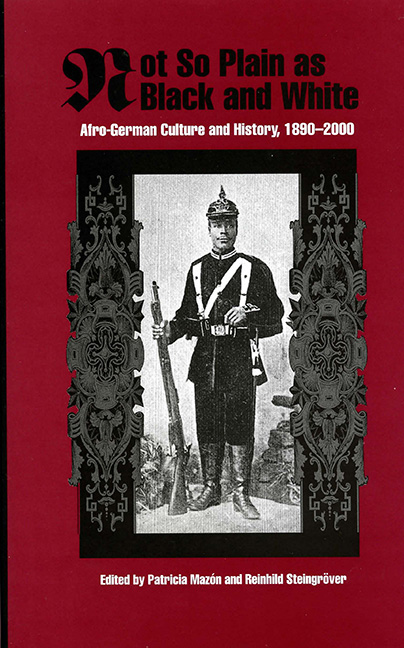Book contents
- Frontmatter
- Contents
- Foreword
- Introduction
- Part I Afro-Germans in Historical Perspective
- Part II Cultural Representations and Self-Representations of Afro-Germans
- 4 Louis Brody and the Black Presence in German Film Before 1945
- 5 Narrating “Race” in 1950s’ West Germany: The Phenomenon of the Toxi Films
- 6 Will Everything Be Fine? Anti-Racist Practice in Recent German Cinema
- 7 Writing Diasporic Identity: Afro-German Literature since 1985
- 8 The Souls of Black Volk: Contradiction? Oxymoron?
- Selected Bibliography
- Notes on Contributors
- Name Index
4 - Louis Brody and the Black Presence in German Film Before 1945
from Part II - Cultural Representations and Self-Representations of Afro-Germans
Published online by Cambridge University Press: 11 May 2017
- Frontmatter
- Contents
- Foreword
- Introduction
- Part I Afro-Germans in Historical Perspective
- Part II Cultural Representations and Self-Representations of Afro-Germans
- 4 Louis Brody and the Black Presence in German Film Before 1945
- 5 Narrating “Race” in 1950s’ West Germany: The Phenomenon of the Toxi Films
- 6 Will Everything Be Fine? Anti-Racist Practice in Recent German Cinema
- 7 Writing Diasporic Identity: Afro-German Literature since 1985
- 8 The Souls of Black Volk: Contradiction? Oxymoron?
- Selected Bibliography
- Notes on Contributors
- Name Index
Summary
The history of people of African descent has profoundly influenced German film. Although blacks have been forced to remain invisible in German society for a long time, they have been highly present on the big screen. However, this visibility contributed in no small part to their loss of individuality: if they appeared in film black actors were always forced to represent a longstanding stereotypical image. Their history in film is one of white fantasies and projections: page boys, bartenders, butlers, musicians, sailors, dancers, bell boys, porters, chauffeurs, and “wild” native people. These have always been the recurring stereotypes that blacks had to fulfill. These images proclaimed not only white superiority, but often also envy and contempt. At the same time these pictures are also historical documents of the everyday reality as well as the presence of blacks in Germany. Because of the prevailing racism in the majority of the population, strategies of economic exclusion and the controlling racial policies during the Nazi period, the majority of blacks in Berlin before 1945 worked at least temporarily as “artists” in the entertainment industry or other areas where they were on display. The predominance of male roles in film reflects the gender-specific mobility within the colonial migration. It is difficult to ascertain today what role the movies played for black Germans, whether as actors or as audience members, and it is too late to reconstruct films’ function as part of their subjective experience. In addition, there are few remaining sources concerning the specific interaction between the film industry and nonwhite actors; those that exist are rarely free of racism. Nonetheless it is beyond doubt that nonwhite actors played a significant role in the consciousness of white German film audiences. In contrast to the U.S., Great Britain, and France, this consciousness did not have a corresponding counterpart in reality. Only a few specific names of film extras or individual actors appear in the censorship files, reviews, or other historical sources. Thus, the production of stereotypical images was perpetuated by the refusal to grant individual identities in the form of names.
- Type
- Chapter
- Information
- Not So Plain as Black and WhiteAfro-German Culture and History, 1890–2000, pp. 109 - 135Publisher: Boydell & BrewerPrint publication year: 2005

